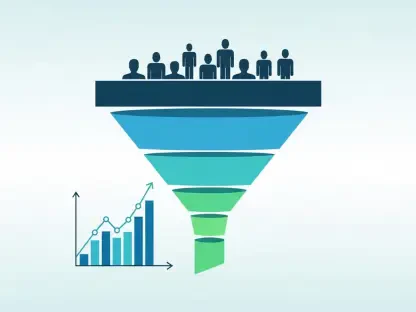In today’s hyper-competitive digital landscape, email marketing remains a cornerstone for businesses aiming to connect with audiences, but standing out in overcrowded inboxes has become a monumental challenge that demands innovative solutions. As of 2025, artificial intelligence (AI) is revolutionizing this space, turning generic email blasts into precision-targeted campaigns that resonate on a personal level. With over 70% of companies already integrating AI into their strategies, according to industry insights, the technology is not just an option but a necessity for driving engagement and revenue. This report delves into how AI is reshaping email marketing, exploring current trends, challenges, and the path forward in a rapidly evolving industry.
The Current State of Email Marketing and AI’s Rising Role
Email marketing has undergone a significant transformation, evolving from broad, one-size-fits-all campaigns to sophisticated, data-driven communications tailored to individual preferences. AI has emerged as a pivotal force in this shift, enabling marketers to analyze vast amounts of behavioral data and craft messages that feel uniquely relevant. The adoption of AI tools is widespread, with major platforms like Klaviyo, Salesforce, and Brevo leading the charge in providing solutions that enhance personalization and efficiency.
The digital environment in 2025 is more competitive than ever, with billions of emails sent daily, making precision targeting essential for cutting through the noise. AI’s ability to optimize content, timing, and audience segmentation ensures that brands can deliver value directly to the right recipients. This growing reliance on technology reflects a broader trend where companies must adapt swiftly to maintain relevance in a crowded market.
Statistics underscore AI’s impact, revealing that businesses leveraging these tools report substantial improvements in key metrics like open rates and customer retention. This shift highlights a critical reality: without AI, email marketing risks becoming obsolete amid rising consumer expectations for personalized experiences. The industry’s trajectory points to an even deeper integration of such innovations as competition intensifies.
Key Trends and Innovations Driving AI in Email Marketing
Cutting-Edge AI Applications and Strategies
AI is powering a wave of innovation in email marketing, with hyper-personalization at the forefront, allowing brands to tailor content based on individual user behaviors like past clicks and purchases. Tools such as Shopify’s dynamic recommendations adapt emails in real time, driving engagement increases of 20-40%, as reported by industry studies. This detailed approach transforms static messages into dynamic interactions that build stronger customer connections.
Beyond personalization, automation of workflows stands out as a game-changer, streamlining tasks from subject line creation to full campaign deployment. Platforms like Phrasee optimize messaging for higher open rates, while solutions from Seventh Sense fine-tune send times for maximum impact. These advancements reduce manual effort, freeing marketers to focus on strategic planning rather than repetitive processes.
Predictive analytics also plays a crucial role, enabling precise timing and churn prevention through machine learning algorithms. Additionally, advanced segmentation and interactive content, such as polls and live updates, further enhance user engagement, while deliverability optimization ensures emails land in inboxes rather than spam folders. Collectively, these strategies underscore AI’s transformative power in crafting impactful email experiences.
Market Growth and Performance Insights
The measurable impact of AI on email marketing is evident in performance data, with open rates rising by 10-30% for brands utilizing these tools. Reports indicate an impressive return on investment, averaging $36 for every dollar spent, highlighting the financial benefits of adoption. This efficiency is driving widespread implementation across sectors, from e-commerce to B2B, as companies recognize the value of data-driven campaigns.
Looking ahead, projections estimate the global email user base will reach 4.8 billion by 2027, signaling a vast opportunity for AI-enhanced strategies. Adoption rates are expected to climb further, with many businesses integrating sustainability practices, such as reducing email frequency to lower digital carbon footprints. Industry platforms and reports emphasize that these dual focuses—performance and responsibility—will shape the market’s evolution.
The data also points to a maturing ecosystem where AI tools are becoming more accessible, even to smaller enterprises, democratizing advanced marketing capabilities. As integration with other technologies like customer data platforms grows, the potential for seamless, high-impact campaigns expands. This trajectory suggests that AI will remain a dominant force in refining email marketing outcomes.
Challenges in Adopting AI for Email Marketing
Implementing AI-driven email strategies is not without obstacles, particularly around data privacy concerns that loom large in a regulatory-heavy landscape. Ensuring compliance with strict standards while collecting and analyzing customer information poses a significant hurdle for many organizations. Mishandling data can erode trust, making it imperative to prioritize secure, transparent practices in every campaign.
Integration with existing systems presents another challenge, as legacy platforms often clash with modern AI tools, leading to inefficiencies or data silos. Overcoming this requires investment in unified customer data platforms, which can centralize information and streamline operations. Such solutions, while effective, demand time and resources that smaller businesses may struggle to allocate.
There’s also the risk of over-reliance on automation, which can strip emails of human creativity and brand authenticity if left unchecked. Striking a balance between AI efficiency and a personal touch is essential to maintain a genuine connection with audiences. Addressing these challenges through careful planning and hybrid approaches ensures that technology enhances rather than overshadows the marketing process.
Regulatory and Ethical Considerations in AI Email Marketing
Navigating the legal landscape is critical for AI-powered email marketing, with regulations like GDPR and CCPA setting strict guidelines on data usage and consumer privacy. Compliance is non-negotiable, requiring brands to implement robust systems for consent management and data protection. Failure to adhere to these standards can result in hefty fines and reputational damage.
Ethical considerations extend beyond legality, emphasizing transparency in how data is collected and used, often through methods like zero-party data from chatbots or preference centers. Building trust with subscribers by clearly communicating data practices is a priority for platforms aiming to foster long-term loyalty. This approach aligns with consumer demand for accountability in digital interactions.
Moreover, ethical AI use involves optimizing send frequencies to avoid spamming, which not only respects user preferences but also supports sustainability by reducing digital clutter. Industry insights highlight that balancing compliance with innovation is key to maintaining credibility. As privacy standards continue to evolve, proactive adaptation will define successful email strategies.
The Future of AI in Email Marketing Beyond 2025
Looking beyond the current year, AI in email marketing is poised to advance with emerging technologies like multi-agent systems, which coordinate complex tasks across campaigns for greater efficiency. These systems promise to handle everything from content creation to cross-channel integration, paving the way for more cohesive user experiences. Early adopters are already exploring such tools to stay ahead of the curve.
Sustainability will also shape future strategies, with eco-friendly targeting gaining traction as brands aim to minimize digital waste through smarter, less frequent sends. Generative AI investments are on the rise, with 92% of businesses planning to adopt these capabilities, signaling a shift toward even more creative and adaptive content. This focus reflects a broader commitment to balancing impact with responsibility.
Global digital growth and shifting consumer preferences will further influence AI’s role, pushing marketers to anticipate needs through predictive insights and tailored messaging. Potential disruptors, such as new privacy laws or tech innovations, could redefine the landscape, requiring agility. The coming years will likely see AI solidify its position as the backbone of email marketing, driven by a blend of innovation and ethical focus.
Harnessing AI for Email Marketing Dominance
Reflecting on the insights gathered, it becomes clear that AI has redefined email marketing through its unparalleled ability to personalize, automate, and analyze at scale. The journey through current trends, challenges, and regulatory landscapes reveals a powerful shift toward data-driven precision that elevates campaign effectiveness. Each advancement, from predictive timing to interactive content, has contributed to stronger audience connections and measurable returns.
Moving forward, businesses should consider piloting a single AI strategy each quarter, measuring impact against established benchmarks to refine their approach. For e-commerce, focusing on revenue-driven tactics like dynamic recommendations proves vital, while B2B sectors benefit from prioritizing lead nurturing through segmentation. These targeted steps ensure gradual, sustainable integration of technology into existing frameworks.
Ultimately, the path to dominance lies in harmonizing AI’s capabilities with human oversight, preserving brand voice amid automation. Investing in clean data practices and staying attuned to evolving consumer expectations emerge as critical next steps. By embracing these principles, marketers position themselves to craft smarter, more impactful email campaigns that resonate deeply in an ever-changing digital world.









